

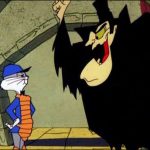

Today, we wind-up coverage of theatrical shorts from the “golden” era (through the dates of the few below might instead suggest silver), and move into some early television references to the sport. As has been my custom of late, I won’t attempt to place all TV offerings in true chronological sequence, Instead, most coverage will be studio-by-studio, though today’s post makes an exception, offering one story from Hanna-Barbera out of sequence, since it fits into a limited category of series from early TV which were offered as multi-chapter cliffhangers We’ll cover together three such serials from various studios, then a few additional miscellaneous tales from Jay Ward to round out the program.
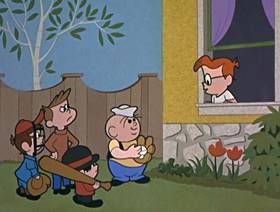 Popcorn and Politics (Paramount, Modern Madcap, 2/62 – Seymour Kneitel, dir.) – A kid with glasses named Specs is studying his math homework, struggling with the multiplication tables. Outside, the neighborhood kids are calling for him to come out and play baseball, as they are one short of players for a game. Not wanting to let the kids down, and anxious for a break anyway, Specs bribes a family parrot with a cracker, to imitate his voice reading the multiplication table. But the trick is discovered by Mom, when she hears from the next room the parrot lapse into “32 men on a dead man’s chest!” Specs is dragged back inside to finish his homework, but Mom tries to soften the blow, telling Specs that if he studies well, someday he could be President. Specs ponders a life in politics, anticipating that a President could do just about anything he wants to. Specs daydreams, imagining himself (still in child form) elected by a landslide. He redecorates the oval office, ousting old furniture (including Truman’s piano, Eisenhower’s golf clubs, and Kennedy’s rocking chair), installs in their place a soda pop vending machine, and carves his name on the presidential desk with a penknife. He appoints the other neighborhood kids as his cabinet. (Secretary of the Army with toy soldiers, Secretary of the Navy with toy bathtub boats and a pool floatation ring around his waist, Secret Service headed by a kid with a junior detective set of disguises.)
Popcorn and Politics (Paramount, Modern Madcap, 2/62 – Seymour Kneitel, dir.) – A kid with glasses named Specs is studying his math homework, struggling with the multiplication tables. Outside, the neighborhood kids are calling for him to come out and play baseball, as they are one short of players for a game. Not wanting to let the kids down, and anxious for a break anyway, Specs bribes a family parrot with a cracker, to imitate his voice reading the multiplication table. But the trick is discovered by Mom, when she hears from the next room the parrot lapse into “32 men on a dead man’s chest!” Specs is dragged back inside to finish his homework, but Mom tries to soften the blow, telling Specs that if he studies well, someday he could be President. Specs ponders a life in politics, anticipating that a President could do just about anything he wants to. Specs daydreams, imagining himself (still in child form) elected by a landslide. He redecorates the oval office, ousting old furniture (including Truman’s piano, Eisenhower’s golf clubs, and Kennedy’s rocking chair), installs in their place a soda pop vending machine, and carves his name on the presidential desk with a penknife. He appoints the other neighborhood kids as his cabinet. (Secretary of the Army with toy soldiers, Secretary of the Navy with toy bathtub boats and a pool floatation ring around his waist, Secret Service headed by a kid with a junior detective set of disguises.)
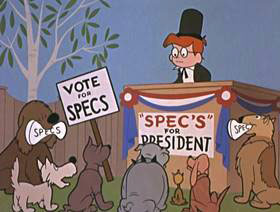 Ultimately, he is about to achieve his dream of tossing out the first pitch on opening day of the professional baseball season, when he is dragged away from the presidential box by an adult aide, who reminds him of duties that must be attended to before such frivolities. First, the budget must be balanced. Specs finds himself struggling again with mathematics over a ledger book. Then, a larger set of books is brought in to review, on foreign aid, Army and Navy expenditures, highway construction, and Social Security. The pile of books grows to a pyramid, as more figures are brought in on mosquito control. Specs has to reach the top of the pile with a stepladder, as a honk from the street below summons Specs to a window view of a long-bed truck, crammed full of books on the recent appropriations bill. The camera pulls back, from Specs’s dream cloud ro the real world, where Specs shakes his head, popping the dream into non-existence, and slams his math book closed, vowing, “That settles it.” Specs disappears out the door again. His Mother calls out the window in protest of his actions, Specs explains that he doesn’t have to study any more, as he’s already been elected President – President of the neighborhood ball club, that is, who carry Specs off on their shoulders, while Specs produces a tall silk hat from nowhere to wear, nodding in appreciation to his constituents.
Ultimately, he is about to achieve his dream of tossing out the first pitch on opening day of the professional baseball season, when he is dragged away from the presidential box by an adult aide, who reminds him of duties that must be attended to before such frivolities. First, the budget must be balanced. Specs finds himself struggling again with mathematics over a ledger book. Then, a larger set of books is brought in to review, on foreign aid, Army and Navy expenditures, highway construction, and Social Security. The pile of books grows to a pyramid, as more figures are brought in on mosquito control. Specs has to reach the top of the pile with a stepladder, as a honk from the street below summons Specs to a window view of a long-bed truck, crammed full of books on the recent appropriations bill. The camera pulls back, from Specs’s dream cloud ro the real world, where Specs shakes his head, popping the dream into non-existence, and slams his math book closed, vowing, “That settles it.” Specs disappears out the door again. His Mother calls out the window in protest of his actions, Specs explains that he doesn’t have to study any more, as he’s already been elected President – President of the neighborhood ball club, that is, who carry Specs off on their shoulders, while Specs produces a tall silk hat from nowhere to wear, nodding in appreciation to his constituents.
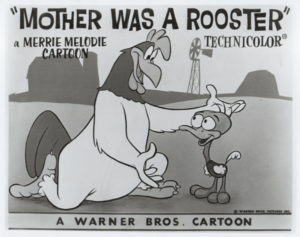 Mother Was a Rooster (Warner, Foghorn Leghorn, 10/20/62 – Robert McKimson, dir.), receives honorable mention for the briefest of baseball sequences. Barnyard Dawg decides things have been dull around the farm lately, so for a lark hijacks an ostrich egg from a nearby ostrich farm, and slips it under Foghorn. It feels like the film is trying to reverse the egg sequence from the much earlier “Crowing Pains”, with Foghorn somehow gullible enough to think that by hatching the egg, he has become a mother. Foghorn adopts the young ostrich who hatches out, but Dawg keeps riling Foggy’s anger, calling the kid the ugliest chicken he’s ever seen. The ostrich develops a complex, sticking its head in the sand every time Dawg calls it names. Dawg also as usual makes life miserable for Foggy with his pranks, as Foggy tries to teach the boy sports and youthful activities. A final insult to the youth during Foggy’s lesson to the boy in baseball, causes Foggy to demand satisfaction from Dawg, slapping him across the face with a baseball glove. The two of them meet, on a platform built within the framework of the posts of a water tower, the platform serving as a boxing ring and temporarily enclosed by ropes. Dawg cheats, taking a punch at Foggy before any bell is rung, then launching a boxing glove at Foggy from the opposite corner, via telephone extender. Foggy has had enough, and drops the gloves, proposing they abandon all rules. “Suits me fine”, says the Dawg, ready to bare-knuckle it. But Foggy pulls a surprise. He leaps upon one end of a board in the platform, which is loose. The board pivots in the muddle as if a see-saw, launching the Dawg off the other end of the board, smack into the bottpm if the water tower above them. Dawg comes down, but finds that two can play this game, as his own landing launches Foggy upwards into the tower. The two play a painful game of teeter-totter, as each landing causes the other to smack their head, until finally, the tower can’t withstand the strain, and is knocked from its pillars, crashing down upon the ring below and the two combatants. As the dust clears, we find the tower destroyed, and Foggy and Dawg both clobbered, so that each of their heads is buried in the dirt, in standard ostrich pose. The young ostrich steps between their two protruding bodies, but, accustomed to his standard method of hiding, is oblivious to his companions’ presence, as if their bodies were invisible. He closes the film with his only lines of dialogue. “They left me all alone. Where did everybody go?”
Mother Was a Rooster (Warner, Foghorn Leghorn, 10/20/62 – Robert McKimson, dir.), receives honorable mention for the briefest of baseball sequences. Barnyard Dawg decides things have been dull around the farm lately, so for a lark hijacks an ostrich egg from a nearby ostrich farm, and slips it under Foghorn. It feels like the film is trying to reverse the egg sequence from the much earlier “Crowing Pains”, with Foghorn somehow gullible enough to think that by hatching the egg, he has become a mother. Foghorn adopts the young ostrich who hatches out, but Dawg keeps riling Foggy’s anger, calling the kid the ugliest chicken he’s ever seen. The ostrich develops a complex, sticking its head in the sand every time Dawg calls it names. Dawg also as usual makes life miserable for Foggy with his pranks, as Foggy tries to teach the boy sports and youthful activities. A final insult to the youth during Foggy’s lesson to the boy in baseball, causes Foggy to demand satisfaction from Dawg, slapping him across the face with a baseball glove. The two of them meet, on a platform built within the framework of the posts of a water tower, the platform serving as a boxing ring and temporarily enclosed by ropes. Dawg cheats, taking a punch at Foggy before any bell is rung, then launching a boxing glove at Foggy from the opposite corner, via telephone extender. Foggy has had enough, and drops the gloves, proposing they abandon all rules. “Suits me fine”, says the Dawg, ready to bare-knuckle it. But Foggy pulls a surprise. He leaps upon one end of a board in the platform, which is loose. The board pivots in the muddle as if a see-saw, launching the Dawg off the other end of the board, smack into the bottpm if the water tower above them. Dawg comes down, but finds that two can play this game, as his own landing launches Foggy upwards into the tower. The two play a painful game of teeter-totter, as each landing causes the other to smack their head, until finally, the tower can’t withstand the strain, and is knocked from its pillars, crashing down upon the ring below and the two combatants. As the dust clears, we find the tower destroyed, and Foggy and Dawg both clobbered, so that each of their heads is buried in the dirt, in standard ostrich pose. The young ostrich steps between their two protruding bodies, but, accustomed to his standard method of hiding, is oblivious to his companions’ presence, as if their bodies were invisible. He closes the film with his only lines of dialogue. “They left me all alone. Where did everybody go?”
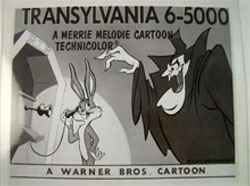 Transylvania 6-5000 (Warner, Bugs Bunny, 11/30/63 – Chuck Jones, dir,) – A better-than-average late entry from the waning days of the studio, and Jones’s last Bugs episode until his comeback with Warner many years later. Pacing seems a bit compressed by the struct six-minute running time, and William Lava’s score isn’t among the best, but somehow the film survives pleasantly, and is a perfect entry for a Halloween program.
Transylvania 6-5000 (Warner, Bugs Bunny, 11/30/63 – Chuck Jones, dir,) – A better-than-average late entry from the waning days of the studio, and Jones’s last Bugs episode until his comeback with Warner many years later. Pacing seems a bit compressed by the struct six-minute running time, and William Lava’s score isn’t among the best, but somehow the film survives pleasantly, and is a perfect entry for a Halloween program.
Bugs is “off his route” again, though at least not having forgotten to take his left turn at Albuquerque. He ends up in Pittsburghe, Transylvania. Seeking directions, he encounters a two-headed female vulture in a tree, whose heads fail to give road directions, but confer among one another that Bugs looks “sweet and crunchy”. Bugs decides to take his inquiries to that “hotel” up the road – actually, the castle of Count Bloodcount – a vampire. Bugs inquires for a phone to call his travel agent, but the polite yet stealthy Count takes him to a room instead, insisting “Sleep first, telephone tomorrow”, and reminding Bugs that rest is good for the blood.
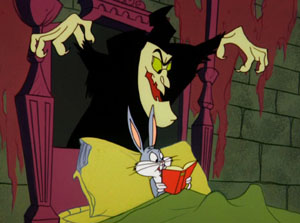 As the Count impatiently waits for Bugs to fall asleep, Buga remarks to himself that it’s the same old problem. He just can’t fall asleep in a strange room, no matter how nice it is. Spotting a bookshelf (most of the titles being on subjects such as classifying blodd types). Bugs spots a volume titled “Magic Words and Phrases”. He begins thumbing through it for a lark to pass the time, reading aloud some of its opening passages. Among the most useful words mentioned within is “Abracadabra”. Just as he utters this, the Count pokes his head in through a secret panel above Bugs’s bed. The Count is instantly transformed into a top-hatted bat. Bugs spots him as he flutters down, and remarks that they sure have got big mosquitoes around here. Pulling out a fly-swatter, Bugs wields it over the Count’s head, muttering “Hold still, you little devil”, and whacks the Count with it firmly. The Count rises from the floor, stumbling about in a daze on his wing tips, and attempts to leave the room via the window balcony. Bugs reaches another passage in the book, referring to a second powerful magic phrase – Hocus Pocus. The Count has just taken flight off the balcony, but is instantly transformed into his vampire self, and falls helplessly into the castle moat. “It is to laugh”, remarks Bugs, closing the book and oblivious to the Count’s fate, chalking up the book as somebody’s sick joke.
As the Count impatiently waits for Bugs to fall asleep, Buga remarks to himself that it’s the same old problem. He just can’t fall asleep in a strange room, no matter how nice it is. Spotting a bookshelf (most of the titles being on subjects such as classifying blodd types). Bugs spots a volume titled “Magic Words and Phrases”. He begins thumbing through it for a lark to pass the time, reading aloud some of its opening passages. Among the most useful words mentioned within is “Abracadabra”. Just as he utters this, the Count pokes his head in through a secret panel above Bugs’s bed. The Count is instantly transformed into a top-hatted bat. Bugs spots him as he flutters down, and remarks that they sure have got big mosquitoes around here. Pulling out a fly-swatter, Bugs wields it over the Count’s head, muttering “Hold still, you little devil”, and whacks the Count with it firmly. The Count rises from the floor, stumbling about in a daze on his wing tips, and attempts to leave the room via the window balcony. Bugs reaches another passage in the book, referring to a second powerful magic phrase – Hocus Pocus. The Count has just taken flight off the balcony, but is instantly transformed into his vampire self, and falls helplessly into the castle moat. “It is to laugh”, remarks Bugs, closing the book and oblivious to the Count’s fate, chalking up the book as somebody’s sick joke.
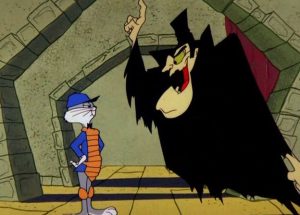 Still unable to sleep, Bugs leaves his room, still in search of a telephone. The Count returns, drifting silently through the corridors of the castle to pounce upon him. Bugs begins playfully scat-singing a few bars of the old Warner song-standard from Doris Day’s debut, “It’s Magic”, but substitutes the word “Abracadabra” in place of the song’s title. The Count is quickly transformed into a bat again. Seeing him again in this form, Bugs thinks another mosquito has gotten in. “They oughta screen this place”, says Bugs, producing an insecticide squirt gun form nowhere, and spraying the Count right in the face, leaving him sputtering and coughing. He attempts to hang upside down from a rafter to catch his breath, but Bugs begins singing again, changing magic words to sing “Hocus Pocus.” The Count converts to vampite again, and falls from the rafter, flat on his face. The Count has had it with stealth, and now presents himself face-to-face to Bugs. “I am a vampire”, he announces. In an abrupt change of approach for Bugs, who up to now has done everything by accident, Bugs somehow catches on that the magic words really work. (Was there perhaps a script cut to keep within the allotted running time?) So Bugs responds, “Well, Abracadabra – I’m an umpire”, instantly transforming Bugs into reversed baseball cap, face mask, and chest protector. “Hocus Pocus – I’m a bat”, shouts the Count, making the transformation. (A continuity error – “Abracadabra” was the bat-transformation word up to this point.) Bugs repeats “Abracadabra”, and becomes a bat, too – a baseball bat! Before he can use himself upon the bat-form Count, the Count puts on a large pair of red glasses, and repeats an old gag from “Hare Splitter”. “You wouldn’t hit a bat with glasses on, would you?” Quick answer – Bugs does. The bashed bat again stumbes around on the floor, falling into a crack between heavy marble tiles in the floor. With a muffled utterance of “Hocus Pocus”, the Count rises from under the stone in vampire form, and lifts the stone tile in an effort to crush Bugs. Bugs responds with a quick “Abracadabra”, transforming vampire to bat again, unable to hold up the heavy stone above him, which crushes him under its weight, falling back into its place within the floor. This action is repeated in rapid succession two more times, as the Count is repeatedly crushed at the utterance of Bugs’s magic phrase. The bat-Count weakly stumbles out from under the stone, having had quite enough of that game.
Still unable to sleep, Bugs leaves his room, still in search of a telephone. The Count returns, drifting silently through the corridors of the castle to pounce upon him. Bugs begins playfully scat-singing a few bars of the old Warner song-standard from Doris Day’s debut, “It’s Magic”, but substitutes the word “Abracadabra” in place of the song’s title. The Count is quickly transformed into a bat again. Seeing him again in this form, Bugs thinks another mosquito has gotten in. “They oughta screen this place”, says Bugs, producing an insecticide squirt gun form nowhere, and spraying the Count right in the face, leaving him sputtering and coughing. He attempts to hang upside down from a rafter to catch his breath, but Bugs begins singing again, changing magic words to sing “Hocus Pocus.” The Count converts to vampite again, and falls from the rafter, flat on his face. The Count has had it with stealth, and now presents himself face-to-face to Bugs. “I am a vampire”, he announces. In an abrupt change of approach for Bugs, who up to now has done everything by accident, Bugs somehow catches on that the magic words really work. (Was there perhaps a script cut to keep within the allotted running time?) So Bugs responds, “Well, Abracadabra – I’m an umpire”, instantly transforming Bugs into reversed baseball cap, face mask, and chest protector. “Hocus Pocus – I’m a bat”, shouts the Count, making the transformation. (A continuity error – “Abracadabra” was the bat-transformation word up to this point.) Bugs repeats “Abracadabra”, and becomes a bat, too – a baseball bat! Before he can use himself upon the bat-form Count, the Count puts on a large pair of red glasses, and repeats an old gag from “Hare Splitter”. “You wouldn’t hit a bat with glasses on, would you?” Quick answer – Bugs does. The bashed bat again stumbes around on the floor, falling into a crack between heavy marble tiles in the floor. With a muffled utterance of “Hocus Pocus”, the Count rises from under the stone in vampire form, and lifts the stone tile in an effort to crush Bugs. Bugs responds with a quick “Abracadabra”, transforming vampire to bat again, unable to hold up the heavy stone above him, which crushes him under its weight, falling back into its place within the floor. This action is repeated in rapid succession two more times, as the Count is repeatedly crushed at the utterance of Bugs’s magic phrase. The bat-Count weakly stumbles out from under the stone, having had quite enough of that game.
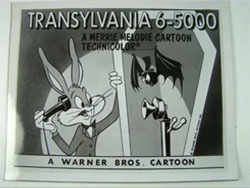 Now Bugs starts having fun with the magic words, uttering, “Abraca-Pocus” The Count transforms into a vampire body with a bat head. “Hocus-Cadabra” produces a full vampire head on a tiny bat body. Now Bugs ad-libs his own odd words. “Newport News” (the odd name of a small town in Virginia). The Count transforms into a cameo for Witch Hazel. Bugs knows he can do better than that, and comes up with the ultimate magic phrase: “Walla Walla, Washington”. The Count instantly becomes a male version of the two-headed vulture seen previously. Bugs walks to a window, and calls out, “Oh, girls!”, summoning the female of the species we previously met. “Look. Agatha”, says one head to the other in delight. Realizing he is the target of amorous interest, the Count takes off in panic into the night through an opposite window, with the female in pursuit, whose heads converse with one another. “Isn’t it romantic?” “I always said four heads are better than one.”
Now Bugs starts having fun with the magic words, uttering, “Abraca-Pocus” The Count transforms into a vampire body with a bat head. “Hocus-Cadabra” produces a full vampire head on a tiny bat body. Now Bugs ad-libs his own odd words. “Newport News” (the odd name of a small town in Virginia). The Count transforms into a cameo for Witch Hazel. Bugs knows he can do better than that, and comes up with the ultimate magic phrase: “Walla Walla, Washington”. The Count instantly becomes a male version of the two-headed vulture seen previously. Bugs walks to a window, and calls out, “Oh, girls!”, summoning the female of the species we previously met. “Look. Agatha”, says one head to the other in delight. Realizing he is the target of amorous interest, the Count takes off in panic into the night through an opposite window, with the female in pursuit, whose heads converse with one another. “Isn’t it romantic?” “I always said four heads are better than one.”
Bugs finally locates a telephone (in a coffin-shaped phone booth). He asks an operator to connect him with his travel agent. While waiting for the connection, Bugs begins singing to himself again, and utters a magic word. His ears are instantly transformed into bat wings. He clicks the receiver, and instructs the operator to cancel the call – he’s decided to fly home! He does so with his new-found wings, out the window into the night sky, for the iris out.
Again, a cartoon which could have made even better use of the clever John Dunn script had it been produced earlier – but a pleasant diversion nonetheless.
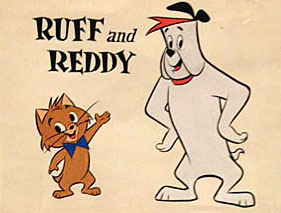 Now, on to television. The Chicken-Hearted Chickasaurus (Hanna-Barbera (H-B Enterprises), Ruff and Reddy, 12/13/58 – 1/10/59 – William Hanna/Joseph Barbera, dir.). The cat and dog duo are reunited for this installment with their old friend Professor Gizmo, who is now curator of a museum. Gizmo has summoned them for help upon receiving an anonymous note (signed, “Anonymous”), threatening that his Chickasaurus egg will be stolen tonight. The egg is a mammoth white monster, bigger than Reddy himself, and a million years old – also worth millions. Ruff and Reddy offer to stand guard overnight – but, as with every cartoon night watchman, fall asleep at their post. Two mummy cases open, and the mummies unwind, revealing old arch-nemeses Killer and Diller. Using the wrappings, they bind up Ruff and Reddy like Christmas packages, and make an escape with the egg in a truck. Gizmo returns and unwinds the boys in time for them to all hop in a car and give chase. Killer and Diller choose a steep mountain road, and shift the truck into “Jet” gear. But the acceleration jolts the egg out the truck’s back hatch, and it rolls down the hill, bouncing off the hood of our heroes’ car, down the road, and off a cliff. Even falling hundreds of feet into a canyon, the egg is not destroyed – merely cracked. The jolt, however, has awakened something inside it.
Now, on to television. The Chicken-Hearted Chickasaurus (Hanna-Barbera (H-B Enterprises), Ruff and Reddy, 12/13/58 – 1/10/59 – William Hanna/Joseph Barbera, dir.). The cat and dog duo are reunited for this installment with their old friend Professor Gizmo, who is now curator of a museum. Gizmo has summoned them for help upon receiving an anonymous note (signed, “Anonymous”), threatening that his Chickasaurus egg will be stolen tonight. The egg is a mammoth white monster, bigger than Reddy himself, and a million years old – also worth millions. Ruff and Reddy offer to stand guard overnight – but, as with every cartoon night watchman, fall asleep at their post. Two mummy cases open, and the mummies unwind, revealing old arch-nemeses Killer and Diller. Using the wrappings, they bind up Ruff and Reddy like Christmas packages, and make an escape with the egg in a truck. Gizmo returns and unwinds the boys in time for them to all hop in a car and give chase. Killer and Diller choose a steep mountain road, and shift the truck into “Jet” gear. But the acceleration jolts the egg out the truck’s back hatch, and it rolls down the hill, bouncing off the hood of our heroes’ car, down the road, and off a cliff. Even falling hundreds of feet into a canyon, the egg is not destroyed – merely cracked. The jolt, however, has awakened something inside it.
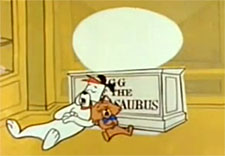 With considerable difficulty (and only after protruding feet run the egg straight into a stone cliff), out pops a mammoth blue and red bird built like a brick wall, wilh a bill full of gleaming teeth. It can speak only one word, over and over – “Greek! Greek!” “It’s all Greek to me”, comments Reddy. But Killer and Diller have caught up with the group, and, resorting to their original Western-style, swing a lariat around the bird’s neck. When the bird won’t budge, they give it a hotfoot. The bird stampedes, ditching the villains. The good guys latch on to the rope, but the chickasaurus takes off, carrying all of them skyward. The bird’s homing instinct takes them to a lost world inside am extinct volcano. Killer and Diller follow in a helicopter. “What if this volcano blows it’s top?” Diller asks. “You’ll never be a successful crook thinking negative”, replies Killer.
With considerable difficulty (and only after protruding feet run the egg straight into a stone cliff), out pops a mammoth blue and red bird built like a brick wall, wilh a bill full of gleaming teeth. It can speak only one word, over and over – “Greek! Greek!” “It’s all Greek to me”, comments Reddy. But Killer and Diller have caught up with the group, and, resorting to their original Western-style, swing a lariat around the bird’s neck. When the bird won’t budge, they give it a hotfoot. The bird stampedes, ditching the villains. The good guys latch on to the rope, but the chickasaurus takes off, carrying all of them skyward. The bird’s homing instinct takes them to a lost world inside am extinct volcano. Killer and Diller follow in a helicopter. “What if this volcano blows it’s top?” Diller asks. “You’ll never be a successful crook thinking negative”, replies Killer.
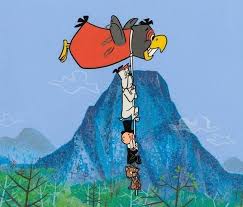 Exiting the crater through a hole in its base, the bird arrives home, losing his passengers when their rope crashes into a cliff side. Our heroes encounter various dinosaurs – mostly harmless vegetarians. But one sure isn’t – a tyrannosaurus. The beast corners our heroes in a cave, and behind them, a pair of mysterious eyes in the darkness give them the further creeps. But the eyes turn out to be a helpful cave kid (named “Ubble Ubble” for his favorite words of dialogue), who believes in speaking softly but carrying a big stick – make that club. The tyrannosaurus is no match for Ubble’s batting ability, as Ubble hits a “home run” batting a rock into the dinosaur’s dome. Before Ubble can lead our heroes to the bird, our lariat bandits appear again and lasso Ubble, lifting him aloft with their helicopter.
Exiting the crater through a hole in its base, the bird arrives home, losing his passengers when their rope crashes into a cliff side. Our heroes encounter various dinosaurs – mostly harmless vegetarians. But one sure isn’t – a tyrannosaurus. The beast corners our heroes in a cave, and behind them, a pair of mysterious eyes in the darkness give them the further creeps. But the eyes turn out to be a helpful cave kid (named “Ubble Ubble” for his favorite words of dialogue), who believes in speaking softly but carrying a big stick – make that club. The tyrannosaurus is no match for Ubble’s batting ability, as Ubble hits a “home run” batting a rock into the dinosaur’s dome. Before Ubble can lead our heroes to the bird, our lariat bandits appear again and lasso Ubble, lifting him aloft with their helicopter.
Ubble chews through the rope, but falls helplessly. He is saved by landing in the newly-built nest of the chickasaurus, who has now laid a pair of new eggs. He and the bird team up to effect a rescue by airlift of our heroes from a saber-tooth tiger, by means of the rope still hanging around the bird’s neck. Unfortunately, when the cat’s away, the mice will play, and the villainous twins have spotted the new eggs from their helicopter. Still carrying our heroes on the rope, the chicakasaurus soars in for an attack to protect the nest. Reddy is low man on the totem pole, and his grip slips on the rope. The bird’s aim, however, is impeccable, and Reddy crash-lands on the bandits, knocking them cold. As reward for Reddy’s help, the chickasaurus presents the group with one of her new eggs for the museum, which Gizmo predicts will eventually hatch “in about a million years”. The group commandeers the crooks’ helicopter, with the egg and crooks secured by rope below. Ubble Ubble stows away, and is adopted by Gizmo, to become the new star of the little league with his batting prowess and personal club to swing. Gizmo loses all of his usual reserve cheering from the bleachers: “This may be undignified, but – – – YIPPEE!!”
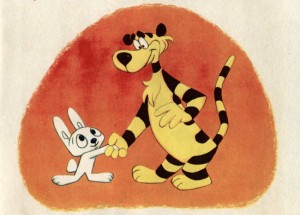 The Great Baseball Mystery (TV Spots/Creston Studios. Crusader Rabbit, 1959) – At Wiggly Field in Galahad Glen, an annual exhibition Out of This World Series is taking place between the Galahad Glen Losers (aptly named for their infallible record of no victories) vs. the world-renown New York Crankees – this year under new management, by one K.C. Strangle (formerly Dudley Knightshade). The Losers have several interesting players, including an octopus who is “a real glove man”, a groundhog (who does his base running underground), a pelican outfielder (who covers all three outfield positions at once, due to his flying ability and wide pouch in which to make catches), and a flea with an unhittable strike zone. But they normally have only two pitchers – a skunk (D.O. Derant) with no outstanding abilities besides his odor, and a goat whose appetite usually gets the better of him, resulting in him eating the ball. However, through some smart trading, the Losers acquire for this year the services of a star pitcher, Carl Bearskin. The stands pack to watch Carl – so much so that Crusader and Ragland T. Tiger can only get seating outside the stadium on the limbs of an apple tree. Carl exits the dugout and steps on the rubber at the mound. Suddenly, a trap door opens under him, and all hopes for the Losers disappear before their eyes – and so does Carl.
The Great Baseball Mystery (TV Spots/Creston Studios. Crusader Rabbit, 1959) – At Wiggly Field in Galahad Glen, an annual exhibition Out of This World Series is taking place between the Galahad Glen Losers (aptly named for their infallible record of no victories) vs. the world-renown New York Crankees – this year under new management, by one K.C. Strangle (formerly Dudley Knightshade). The Losers have several interesting players, including an octopus who is “a real glove man”, a groundhog (who does his base running underground), a pelican outfielder (who covers all three outfield positions at once, due to his flying ability and wide pouch in which to make catches), and a flea with an unhittable strike zone. But they normally have only two pitchers – a skunk (D.O. Derant) with no outstanding abilities besides his odor, and a goat whose appetite usually gets the better of him, resulting in him eating the ball. However, through some smart trading, the Losers acquire for this year the services of a star pitcher, Carl Bearskin. The stands pack to watch Carl – so much so that Crusader and Ragland T. Tiger can only get seating outside the stadium on the limbs of an apple tree. Carl exits the dugout and steps on the rubber at the mound. Suddenly, a trap door opens under him, and all hopes for the Losers disappear before their eyes – and so does Carl.
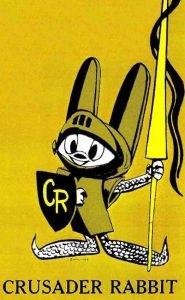 Crusader and Rags chop down the apple tree to gain entrance over the fence, and look for clues. The game gets under-way, but D.O. Derant, forced to serve as pitcher, quickly walks over 43 runs. Rags tries to do his clue-hunting inconspicuously, posing as a hot dog vendor in the stands. Derant gets his arm under control, pitching every ball right over the plate – just where the batters can comfortably hit them over the fence. Soon, there is only one ball left in the park, and that one gets hit foul into Rags’ hot dog basket. The umpire requests that the ball be returned for play, and Rags tosses him one of those Colonel Heeza Liar zig-zag curves, stunning the crowd. Rags is instantly recruited as new pitcher, and seems to be incapable of doing any wrong. He throws hesitation comeback pitches that approach the plate, then pull back three tines before crossing, drawing three strikes on one ball. He pitches over his shoulder, under his legs, and backwards using a mirror, and keeps the Crankees hitless. Meanwhile, the Losers creep up on the score, only 29 runs behind in the bottom of the ninth. The Losers rack up a further succession of runs, by calling up a line of ants as pinch-hitters, repeating the can’t-find-their-strike0zone routine from Paramount’s “Base Brawl”, and bringing the game down to a one-run deficit. Bases loaded, two out – and somehow, Rags comes to bat (though the use of 31 pinch hitter should have ensured that he had been pulled from the game, along with the rest of the starting lineup!). Opposing manager Strangle is livid, and booby-traps a hollow bat with a filling of TNT, monogramming the stick with Rags’ name so he will select it out of the rack. Rags almost does, but at the last minute chooses a heavier bat, remembering Teddy Roosevelt’s motto, “Swing softly, and carry a big stick.” Rags tosses away the unwanted bat – right into the Crankees’ dugout, where it blows up Strangle. Crusader and Rags apologize, meeting Strangle for the first time, and Crusader is pretty sure Strangle and Knightshade are one and the same, making him prime suspect number 1. Meanwhile, Rags takes his place at the plate, setting himself to bunt. But his tiger muscles being as strong as they are, a bunt soars over the fence, for a grand slam! The Losers win their first game.
Crusader and Rags chop down the apple tree to gain entrance over the fence, and look for clues. The game gets under-way, but D.O. Derant, forced to serve as pitcher, quickly walks over 43 runs. Rags tries to do his clue-hunting inconspicuously, posing as a hot dog vendor in the stands. Derant gets his arm under control, pitching every ball right over the plate – just where the batters can comfortably hit them over the fence. Soon, there is only one ball left in the park, and that one gets hit foul into Rags’ hot dog basket. The umpire requests that the ball be returned for play, and Rags tosses him one of those Colonel Heeza Liar zig-zag curves, stunning the crowd. Rags is instantly recruited as new pitcher, and seems to be incapable of doing any wrong. He throws hesitation comeback pitches that approach the plate, then pull back three tines before crossing, drawing three strikes on one ball. He pitches over his shoulder, under his legs, and backwards using a mirror, and keeps the Crankees hitless. Meanwhile, the Losers creep up on the score, only 29 runs behind in the bottom of the ninth. The Losers rack up a further succession of runs, by calling up a line of ants as pinch-hitters, repeating the can’t-find-their-strike0zone routine from Paramount’s “Base Brawl”, and bringing the game down to a one-run deficit. Bases loaded, two out – and somehow, Rags comes to bat (though the use of 31 pinch hitter should have ensured that he had been pulled from the game, along with the rest of the starting lineup!). Opposing manager Strangle is livid, and booby-traps a hollow bat with a filling of TNT, monogramming the stick with Rags’ name so he will select it out of the rack. Rags almost does, but at the last minute chooses a heavier bat, remembering Teddy Roosevelt’s motto, “Swing softly, and carry a big stick.” Rags tosses away the unwanted bat – right into the Crankees’ dugout, where it blows up Strangle. Crusader and Rags apologize, meeting Strangle for the first time, and Crusader is pretty sure Strangle and Knightshade are one and the same, making him prime suspect number 1. Meanwhile, Rags takes his place at the plate, setting himself to bunt. But his tiger muscles being as strong as they are, a bunt soars over the fence, for a grand slam! The Losers win their first game.
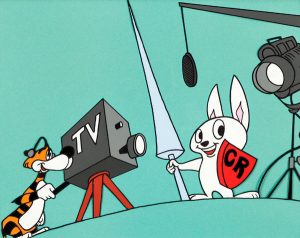 The story wanders all over the map – make that a globe, which Rags uses instead of a map for direction, as Rags is carried off the field, not in the shoulders of his teammates, but by the opposing manager and his henchman. Various attempts are made to do in Rage, and tagalong Crusader, while our heroes play a game of skulking in attempt to catch up with Strangle and ultimately locate Carl Bearskin. When the boys finally do locate Carl in Strangle’s mysterious castle hideout, Strangle has already gotten to him mentally, hypnotizing Carl into thinking he is a ballet dancer. Carl wants only to dance, and has to be dragged back bodily to Wiggly Field, where the series has progressed to its third and final game, the Crankees having taken game 2. The Crankees have already played the first inning, presently leading 103 to nothing. Carl is placed upon the mound, but still refuses to pitch. Crusader gets a brainstorm, and has Rags wheel out upon the field a concert grand piano. Crusader takes up a pen and blank sheet music, and on the spot composes a baseball ballet. Handing out music to the stadium orchestra, and tutus to the home team players, it seems things will get under way. But the other players return to Crusader, turning in their tutus. They are too embarrassed to remain on the field, as Strangle has posted signs facing them from the Crankees’ dugout, reading “Whoops, my dear” and “La De Da”. The Losers thus face the Crankees with only a three-man roster – Carl on the mound, Rags as catcher, and Crusader in the field. It ultimately proves enough, as Carl pitches fast balls on his toes to the strains of Crusader’s music, Rags mounts up hit after hit at bat, and Crusader nimbly handles anything that makes the outfield. The Losers win the series by one run.
The story wanders all over the map – make that a globe, which Rags uses instead of a map for direction, as Rags is carried off the field, not in the shoulders of his teammates, but by the opposing manager and his henchman. Various attempts are made to do in Rage, and tagalong Crusader, while our heroes play a game of skulking in attempt to catch up with Strangle and ultimately locate Carl Bearskin. When the boys finally do locate Carl in Strangle’s mysterious castle hideout, Strangle has already gotten to him mentally, hypnotizing Carl into thinking he is a ballet dancer. Carl wants only to dance, and has to be dragged back bodily to Wiggly Field, where the series has progressed to its third and final game, the Crankees having taken game 2. The Crankees have already played the first inning, presently leading 103 to nothing. Carl is placed upon the mound, but still refuses to pitch. Crusader gets a brainstorm, and has Rags wheel out upon the field a concert grand piano. Crusader takes up a pen and blank sheet music, and on the spot composes a baseball ballet. Handing out music to the stadium orchestra, and tutus to the home team players, it seems things will get under way. But the other players return to Crusader, turning in their tutus. They are too embarrassed to remain on the field, as Strangle has posted signs facing them from the Crankees’ dugout, reading “Whoops, my dear” and “La De Da”. The Losers thus face the Crankees with only a three-man roster – Carl on the mound, Rags as catcher, and Crusader in the field. It ultimately proves enough, as Carl pitches fast balls on his toes to the strains of Crusader’s music, Rags mounts up hit after hit at bat, and Crusader nimbly handles anything that makes the outfield. The Losers win the series by one run.
What becomes of Strangle and his henchman? They remain in baseball – in a sense – at a carnival booth, playing dodgers with their heads through tent holes, as customers toss pitches at them, 10 cents a throw.
• “The Great Baseball Mystery” can be seen on the Internet Archive.
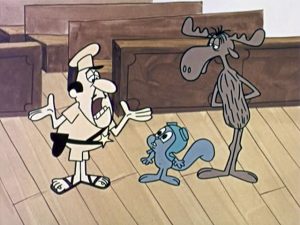 Mucho Loma (Jay Ward, The Bullwinkle Show, 9/9-22/62) – Welcome to the Mexican village of Mucho Loma (English translation: Much Mud). This soggy little town has a problem besides its street conditions – well, perhaps two. An overly-strict municipal code, and a traveler named Guadalupe Rodruguez, who is arrested and sentenced to a one-year imprisonment for singing loudly during siesta time. Upon finally being released, Guadalupe swears revenge upon the town. Absconding with a branding iron shaped like the letter O, and a suit of black duds, from a nearby corral, he assumes the alias of Zero, and rides nightly into the town after sunset, dragging an assortment of clanking pots and pans tied to the tail of his horse, and shouting at the top of his lungs, making sure that no one can get any sleep. On top of that, he uses the branding iron to burn his mark everywhere – the mark of Zero.
Mucho Loma (Jay Ward, The Bullwinkle Show, 9/9-22/62) – Welcome to the Mexican village of Mucho Loma (English translation: Much Mud). This soggy little town has a problem besides its street conditions – well, perhaps two. An overly-strict municipal code, and a traveler named Guadalupe Rodruguez, who is arrested and sentenced to a one-year imprisonment for singing loudly during siesta time. Upon finally being released, Guadalupe swears revenge upon the town. Absconding with a branding iron shaped like the letter O, and a suit of black duds, from a nearby corral, he assumes the alias of Zero, and rides nightly into the town after sunset, dragging an assortment of clanking pots and pans tied to the tail of his horse, and shouting at the top of his lungs, making sure that no one can get any sleep. On top of that, he uses the branding iron to burn his mark everywhere – the mark of Zero.
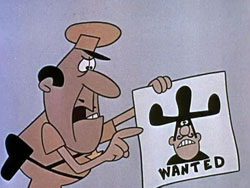 Enter Rocky and Bullwinkle, driving an old car on vacation, and hopelessly lost (Bullwinkle being assigned custody of their only map, but failing to follow Rocky’s instructions to keep it under his hat, pointing out that his head doesn’t have a hat – only a hat rack). Checking a look into the gas tank to see if they’re low on fuel (by casting light into the fuel tank with a cigarette lighter), Bullwinkle causes an explosion, blasting themselves and the car downhill, and smack into the wall of City Hall. For the destruction of the structure, they are sentenced to 99 years. But Rocky manages to talk the judge into a possible pardon, if they can catch the town’s public pest number 1 – Zero. The quest gets complicated as usual (but for once, does not involve Boris and Natasha). At one point, Rocky decides to try to frighten the troublemaker with competition – so disguises Bullwinkle in a duplicate of Zero’s outfit, with the exception of the branding iron – Bullwinkle’s being of the letter X. Things go awry, and despite the non-matching iron, Bullwinkle is mistaken for Zero, arrested, and sentenced to a firing squad. Rocky is given one last chance to prove his pal isn’t Zero, and concocts an idea. Using mud and the branding iron, Rocky draws a tic-tac-toe board on a wall, then starts filling the squares with O’s and X’s. He leaces two spaces open, which, respectively, would win the game for either side on the next move. But Rocky suddenly declares that it isn’t X’s turn to move, the next move belonging to – Zero. Out of nowhere, Guadalupe can’t resist temptation, and appears out of a hiding place to use his branding iron to make the game-winning move. He wins the game, but loses his freedom to the police. Rocky and Bullwinkle patch things up between Zero and the town, by testifying on Zero’s behalf at the trial, finally convincing the judge that Guadalupe hadn’t known he was breaking the law when he was originally arrested. The judge agrees to a parole of Guadalupe – if there is someone who will take custody of him. Rocky knows just who – and soon, Zero finds himself part of the staff in Shea Stadium for the New York Mets (who at the time, were in bottom-place in the league). He is in charge of the scoreboard, having to use his branding iron for each inning, chalking up the inevitable zero score for the Mets every time. As for Rocky and Bullwinkle, their original sentence is pardoned – but they receive a new 30-day sentence – for muddying up the judge’s wall.
Enter Rocky and Bullwinkle, driving an old car on vacation, and hopelessly lost (Bullwinkle being assigned custody of their only map, but failing to follow Rocky’s instructions to keep it under his hat, pointing out that his head doesn’t have a hat – only a hat rack). Checking a look into the gas tank to see if they’re low on fuel (by casting light into the fuel tank with a cigarette lighter), Bullwinkle causes an explosion, blasting themselves and the car downhill, and smack into the wall of City Hall. For the destruction of the structure, they are sentenced to 99 years. But Rocky manages to talk the judge into a possible pardon, if they can catch the town’s public pest number 1 – Zero. The quest gets complicated as usual (but for once, does not involve Boris and Natasha). At one point, Rocky decides to try to frighten the troublemaker with competition – so disguises Bullwinkle in a duplicate of Zero’s outfit, with the exception of the branding iron – Bullwinkle’s being of the letter X. Things go awry, and despite the non-matching iron, Bullwinkle is mistaken for Zero, arrested, and sentenced to a firing squad. Rocky is given one last chance to prove his pal isn’t Zero, and concocts an idea. Using mud and the branding iron, Rocky draws a tic-tac-toe board on a wall, then starts filling the squares with O’s and X’s. He leaces two spaces open, which, respectively, would win the game for either side on the next move. But Rocky suddenly declares that it isn’t X’s turn to move, the next move belonging to – Zero. Out of nowhere, Guadalupe can’t resist temptation, and appears out of a hiding place to use his branding iron to make the game-winning move. He wins the game, but loses his freedom to the police. Rocky and Bullwinkle patch things up between Zero and the town, by testifying on Zero’s behalf at the trial, finally convincing the judge that Guadalupe hadn’t known he was breaking the law when he was originally arrested. The judge agrees to a parole of Guadalupe – if there is someone who will take custody of him. Rocky knows just who – and soon, Zero finds himself part of the staff in Shea Stadium for the New York Mets (who at the time, were in bottom-place in the league). He is in charge of the scoreboard, having to use his branding iron for each inning, chalking up the inevitable zero score for the Mets every time. As for Rocky and Bullwinkle, their original sentence is pardoned – but they receive a new 30-day sentence – for muddying up the judge’s wall.
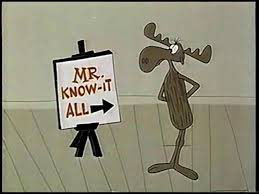 An additional filler segment from the show is on-target for this article: Mr. Know-It-All: How To Be A Successful Baseball Umpire. Bullwinkle takes his cues from a book entitled “The Umpire’s Empire” In an unusual move for the series, Bullwinkle presides over a game played between teams which both feature twin look-alike players, in the spitting Image and voice of Boris Badenov! As one of them (playing for the Finks) slides into the plate, Bullwinkle calls, “Yer out!” He then instructs the audience that by calling the play in a firm voice, he communicates to all that he is fair and impartial, even if you don’t like the decision. The crowd, however, begins to shout in a nasty manner, and the Finks player slugs Bullwinkle over the head with his bat. Bullwinkle changes tune, instructing us that a certain degree of flexibility is often expedient and conducive to good health. “Safe!”, he shouts. A Boris from the opposing team (the Creeps) now bashes the moose over the head. Bullwinkle tries again, now emphasizing that calling a play quickly doesn’t permit the player time to take an emotional side. Not so with these players, as both Borises alternate bashing Bullwinkle as he vacillates between calls of “Out” and :Safe”. Even a change to “Foul Ball” doesn’t do the trick, bringing on clubbings from both. Finally, Bullwinkle invests in protective gear, donning a face mask and chest protector. The Borises, understanding that you can’t get hurt wearing these things, each pit on a mask and protector themselves for their own protection, then begin the dual clubbing of Bullwinkle again, intent to prove that Bulwinkle’s theory of protection is dead wrong. Fade out.
An additional filler segment from the show is on-target for this article: Mr. Know-It-All: How To Be A Successful Baseball Umpire. Bullwinkle takes his cues from a book entitled “The Umpire’s Empire” In an unusual move for the series, Bullwinkle presides over a game played between teams which both feature twin look-alike players, in the spitting Image and voice of Boris Badenov! As one of them (playing for the Finks) slides into the plate, Bullwinkle calls, “Yer out!” He then instructs the audience that by calling the play in a firm voice, he communicates to all that he is fair and impartial, even if you don’t like the decision. The crowd, however, begins to shout in a nasty manner, and the Finks player slugs Bullwinkle over the head with his bat. Bullwinkle changes tune, instructing us that a certain degree of flexibility is often expedient and conducive to good health. “Safe!”, he shouts. A Boris from the opposing team (the Creeps) now bashes the moose over the head. Bullwinkle tries again, now emphasizing that calling a play quickly doesn’t permit the player time to take an emotional side. Not so with these players, as both Borises alternate bashing Bullwinkle as he vacillates between calls of “Out” and :Safe”. Even a change to “Foul Ball” doesn’t do the trick, bringing on clubbings from both. Finally, Bullwinkle invests in protective gear, donning a face mask and chest protector. The Borises, understanding that you can’t get hurt wearing these things, each pit on a mask and protector themselves for their own protection, then begin the dual clubbing of Bullwinkle again, intent to prove that Bulwinkle’s theory of protection is dead wrong. Fade out.
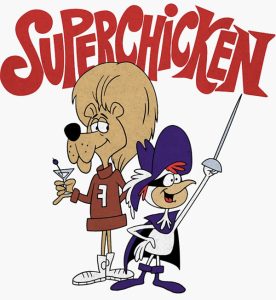 A late Jay Ward episode – in fact, the last of the “Super Chicken” series, also ends with a baseball twist. The Wild Hair (George of the Jungle show,12/30/67). The desolate countryside just outside of Pittsburgh, PA – what better place for the castle of a mad scientist? A pull of a switch (which wreaks havoc with the light bill), and the scientist’s ultimate creation is revealed – the world’s first living toupee. Within seconds, it grows from a Butch to a Duck-Tailed Surfer to a Beatle-Cut. Then it continues to grow, putting a stranglehold on the doctor’s throat. “Now, it’s just plain ridiculous!” Despite the doctor calling for a large-size hair net, the toupee leaps off a parapet and disappears into the night. It’s first stop, a barber shop, where it consumes 47 gallons of hair tonic. The wig goes on a rampage of destruction, then takes a position a la King Kong atop the tallest building in Pittsburgh. Fortunately, the penthouse of that building is the home of Henry Cabot Henhouse III – alias Super Chicken.
A late Jay Ward episode – in fact, the last of the “Super Chicken” series, also ends with a baseball twist. The Wild Hair (George of the Jungle show,12/30/67). The desolate countryside just outside of Pittsburgh, PA – what better place for the castle of a mad scientist? A pull of a switch (which wreaks havoc with the light bill), and the scientist’s ultimate creation is revealed – the world’s first living toupee. Within seconds, it grows from a Butch to a Duck-Tailed Surfer to a Beatle-Cut. Then it continues to grow, putting a stranglehold on the doctor’s throat. “Now, it’s just plain ridiculous!” Despite the doctor calling for a large-size hair net, the toupee leaps off a parapet and disappears into the night. It’s first stop, a barber shop, where it consumes 47 gallons of hair tonic. The wig goes on a rampage of destruction, then takes a position a la King Kong atop the tallest building in Pittsburgh. Fortunately, the penthouse of that building is the home of Henry Cabot Henhouse III – alias Super Chicken.
Fred opens the window for some air, and is immediately seized by a stray lock from the wig. Henry grabs an axe from a suit of armor and sets Fred free, though cluttering up the floor with stray hair something fierce. “This looks like a job for…” begins Henry. “The Puttsburgh Barber College”, said Fred. It takes Henry a few moments to get Fred off this notion, as Fred adds “They’ve got a great varsity squad this year…Number one in all the barber polls.” Finally, Fred admits it’s a job for Super Chicken, and produces Super Sauce without the usual wait to mix it. It’s the new instant kind – just add water. Henry downs it, then gags, and leaps to the ceiling, catching in the chandelier. “I shoulda told ya,” continues Fred, “…Boiling water.”
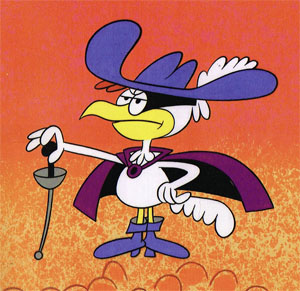 Our heroes take to their egg-shaped conveyance, the Super Coupe. When Fred sees the toupee atop the building, he comments that it makes the old place look years younger. Super Chicken tries a shot from a disintegration ray wristwatch. Copying the old Chuck Jones gag from Duck Dodgers, it disintegrates itself. The chicken then presses a switch that converts the Coup to razor configuration. But the wig grows faster than the Coupe can cut it. Badly hacked at the sideburns, the wig tires of this play, and crawls down the building, disappearing into the streets. Super Chicken gives chase, following a trail of unsightly dandruff. But the narrator points out that this quest was easier said than done, for the wig was a cunning thing, leading our heroes on a multi-state chase. In Nebraska, the wig bleaches itself blonde, to disguise itself as a wheat field. In Oklahoma, it douses itself with “greasy kid stuff” (slogan for the competitor’s product of Vitalis hair tonic) from a gushing oil well, and disguises as a huge pool of oil. The boys finally catch up with it in Tezas, at the Houston Barber Supply Warehouse, glutting itself on the week’s output of hair restorer, and bigger than ever.
Our heroes take to their egg-shaped conveyance, the Super Coupe. When Fred sees the toupee atop the building, he comments that it makes the old place look years younger. Super Chicken tries a shot from a disintegration ray wristwatch. Copying the old Chuck Jones gag from Duck Dodgers, it disintegrates itself. The chicken then presses a switch that converts the Coup to razor configuration. But the wig grows faster than the Coupe can cut it. Badly hacked at the sideburns, the wig tires of this play, and crawls down the building, disappearing into the streets. Super Chicken gives chase, following a trail of unsightly dandruff. But the narrator points out that this quest was easier said than done, for the wig was a cunning thing, leading our heroes on a multi-state chase. In Nebraska, the wig bleaches itself blonde, to disguise itself as a wheat field. In Oklahoma, it douses itself with “greasy kid stuff” (slogan for the competitor’s product of Vitalis hair tonic) from a gushing oil well, and disguises as a huge pool of oil. The boys finally catch up with it in Tezas, at the Houston Barber Supply Warehouse, glutting itself on the week’s output of hair restorer, and bigger than ever.
“What causes hair to fall out, Fred?” asks Super Chicken. “Gravity?” responds Fred. “No. Worry.” So Super Chicken and Fred launch a campaign to worry the toupee to death. Mysterious midnight phone calls; “I see what you’re doing. Aren’t you ashamed?” Telegrams: “Congratulations. It’s twins. Signed, Cupie.” Fake newspaper headlines: “Long Hair Causes Tularemia.” “Congress Passes 20% Tax on All Hair.” And finally, Super Chicken’s masterstroke. A telegram from the draft board: Classification, 1A. That did it. The toupee loses all hair, and is reduced to a powerless bald. Members of the Houston community ask what they’re going to do with a 10-story bald dome. “What else?”, states Super Chicken, changing to an umpire’s outfit. “Play Ball!” The toupee is thus converted into the Houston Astrodome (one of the first indoor baseball stadiums). We briefly witness a game inside, as the narrator closes with “And when you hear that cry in the sky…” But this time, the cavalry-call cluck does not come from the Super Coupe. Instead, it’s from Super Chicken, way up in the bleachers, catching a home run ball.
NEXT WEEK: Mote sportscasts from TV Land.